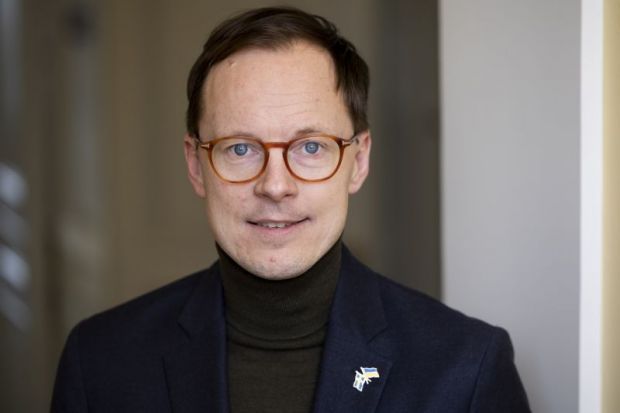For Mats Persson, now Sweden’s education minister in the country’s centre-right coalition government, cancel culture arrived in Sweden on 6 May 2021, the day Mid Sweden University called off a seminar with the writer Kajsa Ekis Ekman, who had been due to present her book Om Könets Existens (On the Existence of Sex). Staff told local media they were worried the 45-minute online format was inappropriate and risked causing offence.
Dr Persson has railed against cancel culture since he became minister in late October 2022, publishing an opinion piece soon after the government was sworn in, in which he claimed the issue was widespread and driven by identity politics among students. “I realised that all these things I’d read about in the US and the UK, now it has come to Sweden,” he told Times Higher Education in Stockholm. Was he surprised? “Sweden is a small country, and we are wannabe Americans and wannabe British, so what happens in the UK and US usually comes to Sweden after a while.”
He has tasked the Swedish Higher Education Authority with investigating how universities are promoting and protecting academic freedom. The agency’s head has said the year-long probe will be built on sensitivity and dialogue, but local media are awash with academics saying the issue has been overblown.
While Dr Persson agreed there were bigger issues facing Swedish academia, he said he saw no risk in overstating the dangers of cancel culture and said a “big silent majority” shared his concerns. “There are so many people who have contacted me and said ‘finally’,” he continued, adding that the UK’s plans to appoint a director of academic freedom within the sector regulator were “interesting”.
Dr Persson earned a doctorate in economic history at Lund University in 2015, the year after he joined Sweden’s national parliament as a member for the Liberals, now the smallest party in the coalition, which relies on parliamentary support from the far-right Sweden Democrats. He had turned down his first offer of a job in regional politics six years earlier, dreaming instead of doing a postdoc at a US university.
Some see government direction of research as a bigger threat to academic freedom than sensitive students, and Dr Persson agreed that references to intersectional feminism in funding calls from Social Democratic governments were “very problematic”. “It’s really important for me that politicians never decide what kind of method or what kind of theory or what kind of research question the researcher should focus on,” he said, contrasting this with looser steers towards societal challenges, such as climate change or digitalisation.
In general, a research background was “definitely” helpful in politics, Dr Persson said. “You get a good feeling for when a statement is reasonable,” he added. “You have a good ability to read a lot of reports and disentangle what is the most important thing.” His wife, an economics professor, “makes me aware of the voice of research”, with damning academic analyses of a school voucher system introduced by a previous Liberal administration informing his recent reforms. “Now we’re changing the system based on what the research says,” he said.
When asked to list the problems in Swedish higher education that are bigger than cancel culture, Dr Persson cited “lack of research quality, lack of internationalisation, lack of innovation”, and said fixing all three was the purpose of the “major reforms” he told the sector he was planning when he took office.
For him, the “most problematic part” of Sweden’s migration policy was that researchers were treated in the same way as asylum seekers. The system had forced foreign staff at the world-leading Karolinska Institute to fly home with newborn children to secure residency permits, but a new policy would set “very, very strict” rules for asylum seekers and “more liberal and modern” ones for high-skilled workers, he said, pitching Sweden’s child-friendly culture as a lure for young, family-minded academics abroad.
Dr Persson added: “This is a big, big change in Swedish policy, both in terms of migration rules and in terms of the economic and research package for international researchers coming to Sweden. It’s a new paradigm.”
Greater internationalisation can bring risk, and Dr Persson has asked universities to take more responsibility for national security issues around research. “We have been a bit naive, and we are changing that at the moment,” he said. “We demanded an increased responsibility a couple of months ago, so now there is a stronger focus on this issue at the universities. I think that’s important.
“But it’s possible that we need to take more action, and guidelines are something we’re analysing,” he added, praising the UK’s approach.
Swedish universities have said that a scale-up of their export control measures – such as expanding the security screening of doctoral students beyond those with Chinese Scholarship Council funding – would create considerable staffing costs, but the minister said no extra funding was planned for the time being. “We have invested a lot of money in higher education in Sweden in the past 10 to 15 years, so at the moment we’re focused on having higher demands on the universities, because I think it’s important for Sweden. That’s the first step.”
后记
Print headline: ‘Cancel culture’ now under fire in Sweden




